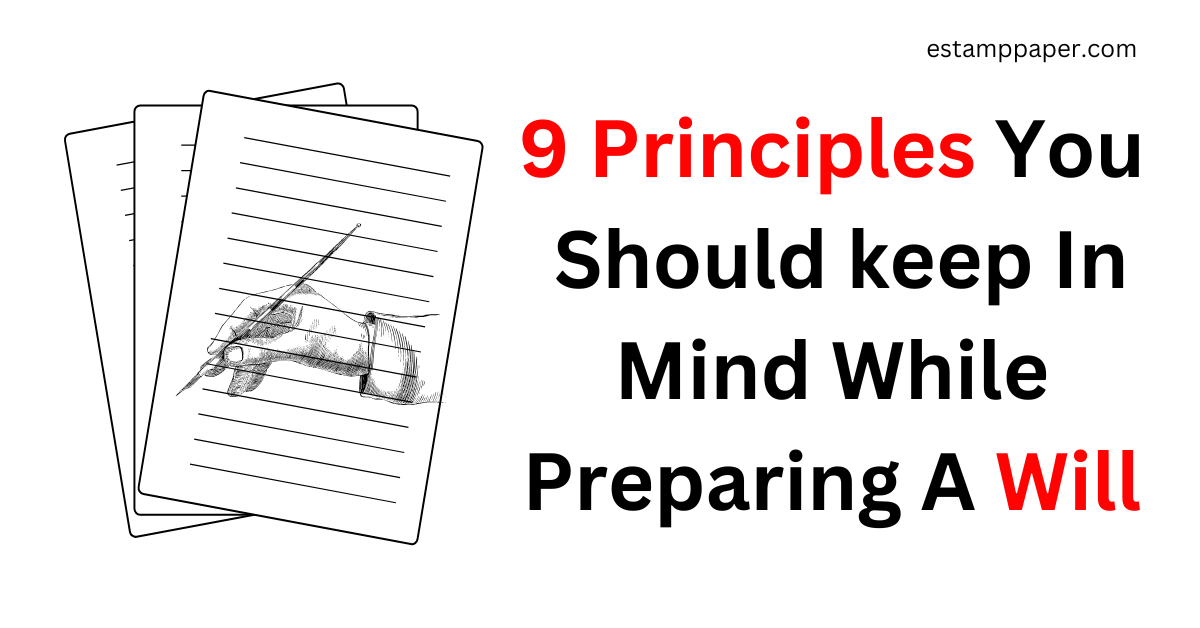Whenever there is talk of a will or advice to make a will for a property, a fear arises in the minds of people that the will can be challenged and it can be cancelled, as if people have a notion that a will is not a proper document to make a person the owner of the property after his death.
This fear or notion has been created because people do not pay attention while preparing an important document like a will and later when it is challenged, its shortcomings are revealed. The reason for this is that to get a will made, you went to a job typist and got the will typed according to your wish.
At that time neither did you know the importance of a will nor did you consider it necessary to take any legal advice. I do not want to say that you should get a will made only from a lawyer.
But you should either study a little about the important things to keep in mind while making a will or take the help of an expert, then you will avoid possible problems in the future. The Supreme Court has given some advice regarding wills in different cases. Many principles have been mentioned in it.
Recently, the case of Meena Pradhan vs Kamala Pradhan came up in which the Supreme Court, citing its decision given in 2021, told what the court should keep in mind while considering the execution and validity of the will. In this, the Supreme Court has stated a total of 11 principles and you should also keep these 11 principles in mind while preparing a will.
Today, on the basis of the same principles stated by the Supreme Court, we will try to understand how a will can be made a strong will. You have to prove in the court that the person who has made the will has actually made it and this will was his last will.
This is because if more than one will comes forward for the same property, then the court will validate only the last will because the importance is of the last will. Along with this, you will also have to prove that the will has been executed by the testator.
For this, you will be able to prove the will by getting the statements of the witnesses of the will recorded in the court. So for the first point, the important thing to remember is that you should make only those people witnesses to the Will who can come to court and testify for you if required.
If a Will has already been made, it should state that the testator made the Will on a certain date which is being revoked and that this Will is his last Will.
As for the second principle, the Supreme Court said that it does not have to be proved with mathematical precision but on the touchstone of the satisfaction of a prudent mind. That is, there is no mathematical formula by which the Will has to be proved.
It is just that the manner in which the Will has been proved in court should enable a person of ordinary intelligence to form the opinion that the Will was made in the right manner. This is also because there is no specific or strict law for Wills. The Will must be registered.
Most Important Thing In section 63
The third principle is that the Will must fulfill all the formalities required under Section 63 of the Inheritance Act. A total of four things have been made mandatory in Section 63. First, the person making the will must have signed the will with the intention of making the will.
that is, at that time he must know that he is making a will of his property in favour of someone else. This simply means that if he has been deceived or has been made to sign by telling him something else, then the will has no value.
The second important thing for section 63 is that the will must be attested by at least two witnesses, that is, there can be more than two witnesses in a will, but there should not be less. The third important thing is that every witness should either have seen the testator signing or the person making the will must have admitted before the witness that he has made and signed the will.
The fourth important thing of section 63 is that every witness to the will must have signed in the presence of the testator. Although it is not necessary that all the witnesses are present together, but the signature of the witness should be in the presence of the testator.
The next principle is that if a document is registered, then generally it should be attested in the court. There is no need to record the statements of witnesses to prove a will, but even after registering the will, if the will is challenged, it is necessary to record the statement of at least one witness of the will in the court.
However, if all the witnesses have died, then there is a separate provision for that, but always keep in mind that the statements of witnesses will have to be recorded to prove the will in the court. The fifth principle related to this is that when a witness comes to give a statement in the court, he has to record his statement.
The Sixth Principle Supreme Court Said
As the sixth principle, the Supreme Court said that if even one of the witnesses of the will comes and proves the will, then there will be no need to call the rest of the witnesses, rather the witness in the will should be a person who is a prudent person of common sense, so that he can go to the court and prove the execution of the will without any hesitation. Therefore, the witnesses of the will should be selected carefully.
After this, the eighth principle is very important that whenever there is any doubt about the execution of the will, it is the responsibility of the proposer to remove all the validity before accepting the will as the last will of the testator.
In such cases, the initial responsibility on the proposer is that if the other party has raised any doubt about the execution of the will, then the responsibility of removing every such doubt lies on the person who claims any right on the basis of the will. It is not necessary that the work will be done by just getting the statements of the witnesses of the will recorded in the court.
What grounds has the person challenging the will taken and what documents or material has been produced to prove those grounds? You have to produce evidence against all of them.
As the ninth principle, said that the court will mainly see what was the mental state of the person making the will at the time of making the will, i.e. whether he was able to understand that he was making his will to give his property to someone else.
The court will also see whether the will was made as per the will or not. The person who made the will was executing the will of his own free will and there was no pressure of any kind on him, that is why most experts give the opinion that if the person making the will has any health problem or is very old at the time of making the will, then a certificate should be made from the doctor for his mental state so that its execution can be proved without any doubt.


